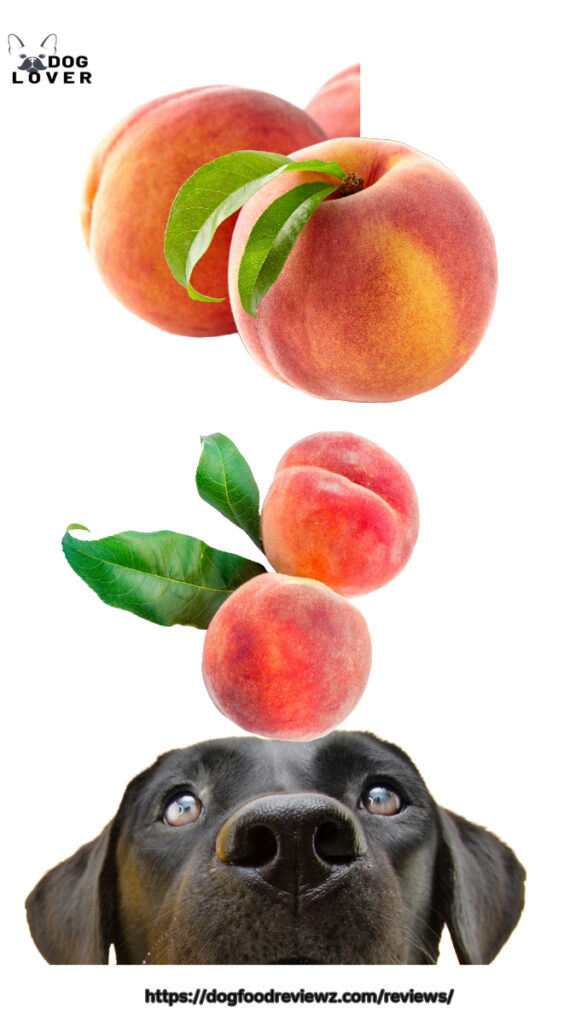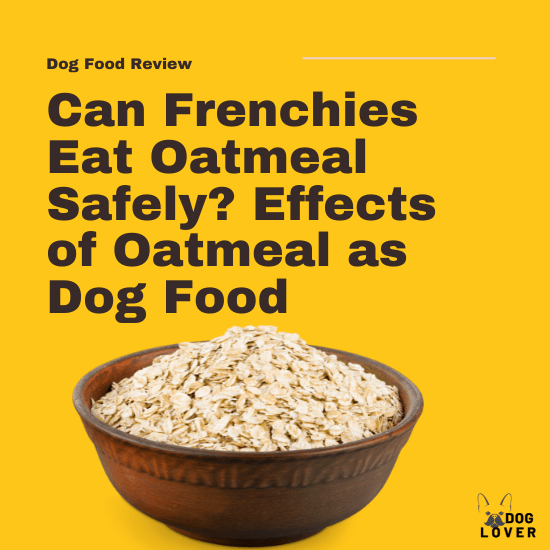Peaches are a delightful, juicy fruit enjoyed by many during the summer, and the good news is that dogs can eat peaches safely.
These fruits are packed with nutrients that can support your dog’s health, but there are a few things to consider before offering them as a treat.
In this post, we’ll dive into the benefits of peaches for dogs, how to serve them safely, and the best peach-related dog foods and recipes.

Nutritional Benefits of Peaches for Dogs
Peaches are a healthy snack for dogs when offered in moderation. They are rich in vitamins, minerals, and antioxidants that provide multiple health benefits:
- Rich in Beta-Carotene and Vitamin A: Peaches contain beta-carotene, which is converted into vitamin A in the body. Vitamin A is crucial for your dog’s vision, skin health, and immune system. It also supports healthy cell growth and function.
- High in Vitamin C: Vitamin C in peaches helps boost your dog’s immune system, promotes healthy skin, and protects against oxidative stress. It also aids in collagen formation, which is important for joint health.
- Fiber for Digestive Health: Peaches are an excellent source of dietary fiber, which helps promote a healthy digestive system and prevent constipation. Fiber also supports weight management by making dogs feel full faster.
- Hydration: Peaches have a high water content, making them a great hydrating snack, especially during hot summer months. Proper hydration supports digestion, detoxification, and overall wellness.
- Potassium for Heart Health: Potassium helps regulate fluid balance and supports proper heart and muscle function, making it essential for maintaining a healthy cardiovascular system.
- Antioxidants for Brain Health: Peaches contain antioxidants that help protect against free radicals, which can contribute to the development of chronic diseases, including cancer and inflammatory conditions.
How to safely serve peaches to your dog
While peaches are beneficial for dogs, there are some safety precautions to keep in mind:
Remove the Pit: The pit of a peach is a choking hazard and can cause injury to your dog’s digestive system. Additionally, peach pits contain cyanide, which is toxic to dogs. Always remove the pit before serving.
Wash Thoroughly: Make sure to wash the peach thoroughly to remove any pesticides or dirt that might be on the skin.
Serve in Moderation: Due to the natural sugars in peaches, it’s important to serve them in moderation. Overconsumption of peaches could lead to digestive upset or long-term health issues like diabetes. One or two slices as an occasional treat is enough.
Peach Skin: Dogs can eat peach skin, which provides additional fiber and vitamin C. However, ensure it is clean and pesticide-free before serving.
Can Dogs Eat Different Forms of Peaches?
Peaches come in many forms, such as fresh, pureed, frozen, or even as part of dog food recipes. Let’s explore how each of these is safe for your dog:
Fresh Peaches
Fresh peaches are a healthy snack, as long as the pit is removed and they are served in moderation.
Puree Peaches
Puree peaches are also safe for dogs. The smooth texture makes them easy to digest. They are rich in vitamins, potassium, fiber, and antioxidants, which are beneficial for your dog’s overall health.
Pureed peaches are a great addition to homemade dog treats or mixed with other fruits like bananas or apples.
Frozen Peaches
Frozen peaches are a refreshing treat, especially during the summer. They help with hydration and dental health because chewing on frozen fruits can promote healthier teeth.
Additionally, the manganese in frozen peaches supports energy production and healthy bone formation. Make sure to serve them in small portions to avoid any choking hazards.
Peach Yogurt
Peach yogurt can be a good option for dogs that are not lactose intolerant. The probiotics in yogurt help with digestion, while the vitamins and antioxidants from peaches support the immune system.
However, be cautious with flavored yogurts, as they may contain added sugars or artificial sweeteners, which are harmful to dogs.
Peach Smoothies
Peach smoothies made with dog-friendly ingredients, like plain yogurt and water, can be a hydrating and nutritious snack. They are rich in fiber and antioxidants, helping to keep your dog’s digestive system and brain healthy.
Peach Jam
Avoid giving your dog peach jam, as it contains too much sugar, which can lead to diabetes, obesity, and other health problems. Additionally, some commercially sold jams may contain artificial sweeteners like xylitol, which is highly toxic to dogs.
Dried Peaches
Dried peaches are safe for dogs but should be given in moderation due to their high sugar concentration. They provide similar health benefits as fresh peaches but are more concentrated in nutrients like vitamin A, fiber, and potassium.
Peach Ice Cream
While peach ice cream might sound tempting, it’s not a good choice for dogs. Ice cream typically contains lactose, which can cause stomach upset, and the added sugar can lead to pancreatitis or other issues. Additionally, some ice creams contain chocolate or xylitol, both of which are toxic to dogs.
What About White Peaches and Nectarines?
Both white peaches and nectarines are safe for dogs to eat. These fruits provide similar nutritional benefits as regular peaches, including vitamins A, C, and fiber. White peaches have a slightly milder taste, while nectarines are more aromatic but are just as healthy.
Can Dogs Eat Peaches and Other Fruits Together?
Peaches pair well with many other fruits, adding variety and nutrition to your dog’s diet. Some great fruit pairings for peaches include:
- Nectarines: Both fruits provide vitamins A, C, and fiber, supporting immune health and digestive wellness.
- Plums: While plums are safe, ensure to remove the pit, as it can be toxic to dogs. Plums, like peaches, are rich in antioxidants and fiber.
- Apricots: Similar to peaches, apricots are high in beta-carotene and fiber. Removing the pit reduces the risk of cyanide poisoning.
- Mangoes: Mangoes and peaches together create a nutrient-packed combo, offering vitamins A, C, and fiber.
Peach-Based Dog Food Recipes
If you’re interested in incorporating peaches into your dog’s regular diet, there are plenty of creative ways to do so. Here are a few dog food recipes that feature peaches:
Peach Cookie Dog Treats:
Preheat the oven to 350°F. Blend one sliced peach with two tablespoons of honey and ¼ cup of water.
In a large bowl, mix 2 cups of oats and 1 ½ cups of whole wheat flour, then add the peach mixture.
Knead until smooth, roll into ¼-inch thick rounds, and bake for 10 minutes.
Frozen Peach Dog Treats:
Blend 1 cup of Greek yogurt, 1 whole peach (sliced), and 2 tablespoons of honey.
Pour the mixture into silicone molds and freeze for 1 hour. These make refreshing summer treats.
Peanut Butter Peach Frozen Dog Food Treats:
Blend ½ cup of peanut butter, 3 cups of plain yogurt, 1 banana, and ½ a peach. Pour the mixture into an ice tray and freeze for 45 minutes for a tasty, nutritious treat.
Best Commercial Dog Foods with Peaches
Several commercial dog foods incorporate peaches, allowing you to provide your dog with the benefits of this fruit while ensuring their diet is balanced. Some top picks include:
- Cesar Jerky Bites Grain-Free Recipe with Pork & Peach Dog Treats
- Grandma Lucy’s Oven-Baked Organic Peach Dog Treats
- Terra Canis Horse Amaranth & Peach Wet Dog Food
These products combine the benefits of peaches with other wholesome ingredients, making them great options for your dog’s health.
Conclusion
Peaches can be a healthy and delicious treat for your dog, providing a variety of nutritional benefits like vitamins, fiber, and antioxidants.
However, it’s important to serve peaches in moderation and follow safety guidelines to avoid any risks, such as choking on the pit.
Whether served fresh, pureed, frozen, or incorporated into homemade treats, peaches can be a great addition to your dog’s diet and contribute to their overall health and well-being.


